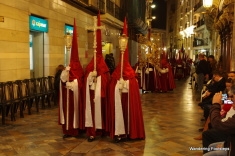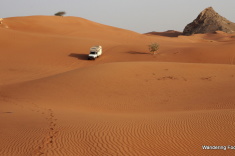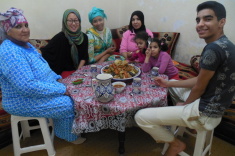Do you ever wish that you had your own private tour guide on a trip to a new and unfamiliar land? Not one of those hired guides who repeats the same jokes and historical tidbits to the faceless groups of tourists he encounters on a day-to-day basis. No, your own secret guide. An insider, a local – nay, a friend – who can unlock the mysteries of an otherwise baffling place.
I often wish for this. And, for a couple of November days in Northern Spain, I got my wish.
We’re with Josu and Ana in Castro Urdiales, a small town at the edge of Cantabria province. We’re parked on green hills along the coast just in front of the town’s old cemetery. A muddy path leads to the center of Castro, with its long city beach, striking Gothic church, and alleyways jam-packed with weekenders from Bilbao munching on pinchos and sipping on sunny afternoon glasses of cider.
.jpg)
Castro’s lovely church over its equally lovely port.
.jpg)
The back alleys of Castro are simply bustling today!
.jpg)
Not bad for a free campsite, eh?

Yay, it’s Josu and Ana! (Gotta have some food to accompany our conversation!)
We’re catching up with our overlander friends. Since we last saw them (at the beginning of the year in Sudan), Josu and Ana have been busy. They drove through Saudi Arabia, visited Jordan and Israel, took a boat to Italy, left their vehicle in Spain, backpacked on the Trans-Siberian railroad, and cycled over 3,000km in South Korea and Japan. There’s obviously a lot of news to exchange.
Before meeting Josu and Ana last year, Bruno had told me a lot of stories about them. One of the first and most frequent ones goes like this: Josu and Ana are Basque. They are so Basque that when they cross an international border and the immigration official asks them their nationality, they say Basque. The immigration official looks at their passport and replies, You’re Spanish, and Josu returns, No, we’re Basque.
Well, we spent a few days visiting Spain’s Basque Country before walking the Camino de Santiago, and I have a lot of questions about my experiences. Josu and Ana are the perfect private tour guides to unlock for me the complex and mysterious world of the Basques.
I first started noticing signs of Basque presence in Pamplona, the capital of Spain’s Navarra province. Street signs were written in Spanish and Basque – a language filled with uncommon English letters like X and Z. Tapas wasn’t tapas (or even pinchos) here – it was pintxos. And, when I listened carefully to the chatter around me, I could decipher sounds that are definitely not part of the Spanish language. It turns out I was hearing Euskara, one of the oldest languages in the world, and not part of the Roman language system. I don’t even know how to begin pronouncing the sound “tx.”

We’re in Pamplona, yippee!

Signs are in Spanish AND Basque in Pamplona.

Locals munching away at pintxos, the Basque version of tapas.

Try THIS Basque mouthful!
It turns out that Basque country extends far outside the Spanish limits of the province named Basque Country. For Basques, Basque Country – or Euskal Herria – is composed of seven provinces – the three officially recognized by Spain, three in France, and Navarra.
The reasons the world doesn’t recognize Basque Country in the same way Basque people do are complex, and their root causes date back centuries. They are mostly beyond the scope of my understanding, so let’s just say that, as in many other regions of the world, history is a lot messier than the clear-cut nature of borders implies. It should be no surprise that I’m experiencing my first traces of Basqueness outside official Basque Country.
It was a surprise, though, that when we arrived in Bilbao, Basque Country’s largest city, I heard more Spanish than Euskara. Bruno and I spent a morning walking around Bilbao’s shopping district – wide boulevards with elegant top brand-name shops – before crossing over a wide river into the city’s historical district. I came expecting to find Basqueness all over the place, but all I saw were shops selling full body-parts of jamón and the same pintxos bars I experienced in Pamplona.

Jamón is all over Spain.

A tiny alley in historical Bilbao.
It’s no shock to Josu and Ana that I heard so much Spanish in their unofficial capital (the official capital is Vitoria-Gasteiz, Gasteiz being the Basque name for the city). Basque Country is a great place to live, and many Spaniards want to make their home here. At first I assumed this was typical Basque pride talking, but then I learned that it actually comes down to politics: Basque Country is actually an autonomous community of Spain, something that was agreed upon in the 1970s.
Basically, unlike the other provinces of Spain, Basque Country manages their own public finances and has their own police corps. In practice, this means that Basque Country gets to use their tax money as needed before sending their leftovers to Madrid. (Other provinces must do the reverse – send their tax money to Madrid and wait for the capital to redistribute the funds across the country as they see fit.) This means that Basque Country’s services and infrastructure are better than a lot of the rest of Spain, drawing many Spaniards to the province.
We go out for pintxos with Josu and Ana one afternoon in Castro. As we sit at the bar sipping our cider, the bartender tells Josu in Spanish about his desire to move to Bilbao. Yet another Spanish-speaker in Bilbao, perhaps? At least they immigrate freely now, says Josu. In the Franco years, the influx of Spaniards in Basque Country (officially there as manpower for a growing industrialist economy) often served to spy on the Basque Nationalists and dilute Basque culture.

On our way to pinchos in Castro with Josu and Ana.

At the pinchos bar. The guy pouring the cider is the one who wants to live in Bilbao.
Indeed, the Franco years were a difficult time for the Basques. Among other things, Franco forbade them from speaking their language. An entire generation of Basques were raised unable to learn Euskara. Ana learned as an adult – in fact, it was through a Basque-only group trip that she met Josu! – but it wasn’t an easy language to learn, and she admits to not speaking as well as the generations older and younger than her. Javi, Phil and Angie’s friend that we had met a few weeks before, is also Basque, but he doesn’t much speak Euskara at all because he had felt forced into learning it after Franco, so rebelled.
It seems the newer generations – people my age and younger – are embracing, rather than rebelling against, their Basque heritage. On our drive to Bilbao I noticed a town called Durango on the map. “Durango” is the family name of my brother’s long-time Ecuadorian girlfriend, Ara. I wanted to stop there – just for a minute – to tell Ara I’d been to her family’s Spanish town.
Without knowing it, we’d party-crashed on Durango’s yearly patron saint celebration, and we found ourselves in the middle of a Basque celebration like no other. An all-men choir sand traditional Basque songs. Little kids dressed in traditional clothing, old men wore Basque berets, and young adults sported t-shirts displaying the True Basque Country map – all seven provinces of it. Best of all, there was a big strength and endurance competition underway, the infamous Basque Herri Kirolak.

Little girls in traditional outfits.

The True map of Basque Country, according to Basques.
Basques sports are rooted in their old rural lifestyle. They involve things like chopping and sawing wood, or dragging, lifting and tossing heavy things (bales of hay, sacks of vegetables, stones, hoes). The name of each game is indecipherable to a non-Basque, as the amount of “tx” and “tz” sounds is astounding.
In Durango, we witnessed the lifting of various weights, the carrying of heavy sacks, and the throwing of bales of hay over very high poles. My favorite games involved wood. In one, a man climbed a makeshift tree by cutting V-shapes into the trunk then placing wooden poles up the sides so that he could chop the top tip off the tree. In another, two teams of two cutters chopped series of tree trunks arranged on the ground. They had to stand on the trunk and hack down in V-shapes from both sides. This game went on for over twenty minutes, and had the crowd watching enrapt throughout.
I didn’t understand the exact purpose of each game, and the MC’s play-by-play in Euskara didn’t help. Still, I couldn’t believe my good fortune. In the little town of Durango, we’d inadvertently stumbled into the heart of Basque Country and saw that Basqueness is, indeed, alive and well.

The big games in Durango.

That’s a bale of hay up there.

My favorite game.

My other favorite.
I suppose I shouldn’t be surprised. The Basques have been around for a very long time, and they’ve always managed to bounce back after hard times. According to the book I’m reading now, The Basque History of the World (lent to me by none other than Josu and Ana):
When Basques first began appearing on the stage of recorded history, even before there was a name for them, they were observed acting like Basques, playing out the same roles that they have been playing ever since: defending their land and culture, making complex choices about the degree of independence that was needed to preserve their way of life, while looking to the rest of the world for commercial opportunities to ensure their prosperity.
I’m only 80 pages into the book, but, so far, the author, Mark Kurlansky, credits the Basque people with a lot of things – the best boat-makers, the first and most prolific whalers, the first to salt (and therefore preserve) cod, and the first to arrive in the Americas (Newfoundland, to be exact).
It seems the Basques weren’t only farmers, but fishermen too. In Lekeitio, a small fishing village near Bilbao that we visited on Javi and Jasmine’s recommendation (it’s where they met), Bruno and I saw this firsthand. Lekeitio has a long history of whaling – the town’s seal even includes an image of a whale. We were there only briefly (rainy, cold weather), but we spent an afternoon along the charming port.

Lequeitio, or Lekeitio in Basque.

Lekeitio’s lovely port.
At a café in Lekeitio, we befriended some French-speakers who turned out to be from the French Pays Basque. When we told them about our worldwide travels, they asked if we’d been to Bayonne, the capital of their Basque region. You wouldn’t believe the shock on their faces when we replied that we hadn’t been there yet. But it’s the best place in the world, they cried.
At dawn at our campsite near Castro Urdiales, Bruno and I watch the sun rise over breakfast with Josu and Ana. From our viewpoint, we can see the port of Bilbao and the big hill behind which is their beloved Basque city. The sun rises just beyond that hill.
“Hey look,” we say to Josu and Ana, “the sun is rising over Bilbao!”
“Of course,” they shrug, not at all surprised. “Bilbao is the center of the world!” The statement is a joke, of course, but the pride associated with that statement is not. Josu and Ana, Javi, and the French Basques in Lekeitio all share two things – they are Basque, and they are proud of it. If Mr. Kurlansky is correct, they have good reason to be.

Breakfast with Josu and Ana.

When the sun rose a few hours ago, it rose over Bilbao, off in the distance.
In recent years, the Basques have made international headlines for the negative, rather than the good, however. Sabino Arana, the creator of Basque Nationalism, was xenophobic and violent, and some of that violence has lasted until today, in the armed separatist group, ETA. The group wants independence from Spain and France, and, though they are currently negotiating peace, they’ve been known to break cease-fires in the past.
Josu and Ana don’t want independence, necessarily. They just want to be recognized as separate from the Spanish. They feel Basque first, and they want Spain to recognize that they are a distinct ethnic group within the whole. Josu’s declarations at border controls illustrate that, but so do his wishes for us to visit him in his country one day, as though us camping with him on the beaches of Castro Urdiales doesn’t count.
The tide is beginning to shift in Spain in ways that may have deep implications for the Basques. For the first time, Basque interests are at the head in Navarra province because the small Basque factions finally united and carried the election. In the Spanish constitution is a clause whereby if Navarra wants to become part of Basque Country, it can (though Josu thinks Madrid will try to change that constitutional clause now). And, with Catalonia gaining so much sway in their bid for independence, the Basques are watching carefully. Whatever Europe determines regarding the Catalonia question will impact the direction the Basque government takes with its own independence quest.
Whatever happens, I have a feeling that Josu, Ana, and their fellow Basques will continue to be as smart as they have for centuries – defending their land and culture while making complex choices about the degree of independence that is needed to preserve their way of life, a way of life I’ve come just a little closer to understanding after a few days with my own private tour guides.

Thank you for being such great tour guides (and friends), Josu and Ana.



Louise Jones-Takata - Nicely done. I like the “Reportage” on Basque Country. I actually travelled to Bilbao because I wanted to experience/visit the Guggenheim Museum designed by Canadian/American architect Frank Gehry. In my opinion the Museum outdoes the collections.
Brittany - Thanks for the comment Louise – the Basques are a fascinating group of people. I would encourage you to read the book I mentioned in the post if you’re interested in learning more.
Sadly, we didn’t catch the Guggenheim in Bilbao, but that makes for a reason to go back one day! 🙂
rcs - Perhaps one of your most enlightening articles ever. Made me see a lot of similarities with Canada and other parts of the world.
Distinct in culture and wanting to be recognized as separate from Spain is very similar to the Quebecois here in Canada.
Also the Basques ‘rural’ sports make me think of the Highland Games found in Nova Scotia; these were brought to Canada from Scotland hundreds of years ago.
Brittany - Well, as I mentioned, the Basques may have been the first Europeans in Newfoundland, and apparently there are a few place names after them – as well as actual Basques – in the east coast of Canada. We should go on the lookout for them this summer!!